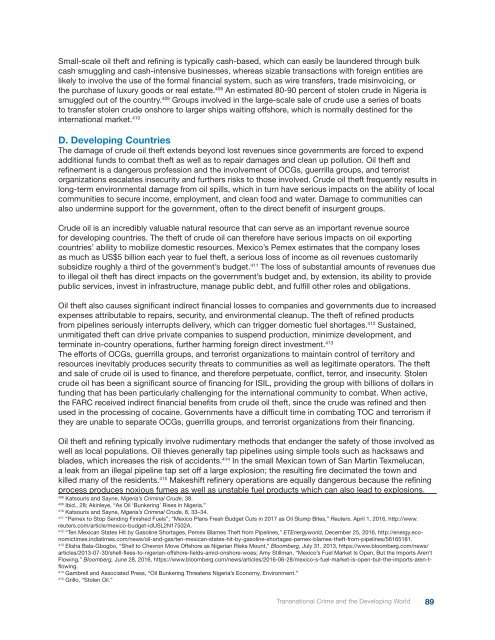Transnational Crime and the Developing World
Transnational_Crime-final
Transnational_Crime-final
Create successful ePaper yourself
Turn your PDF publications into a flip-book with our unique Google optimized e-Paper software.
Small-scale oil <strong>the</strong>ft <strong>and</strong> refining is typically cash-based, which can easily be laundered through bulk<br />
cash smuggling <strong>and</strong> cash-intensive businesses, whereas sizable transactions with foreign entities are<br />
likely to involve <strong>the</strong> use of <strong>the</strong> formal financial system, such as wire transfers, trade misinvoicing, or<br />
<strong>the</strong> purchase of luxury goods or real estate. 408 An estimated 80-90 percent of stolen crude in Nigeria is<br />
smuggled out of <strong>the</strong> country. 409 Groups involved in <strong>the</strong> large-scale sale of crude use a series of boats<br />
to transfer stolen crude onshore to larger ships waiting offshore, which is normally destined for <strong>the</strong><br />
international market. 410<br />
D. <strong>Developing</strong> Countries<br />
The damage of crude oil <strong>the</strong>ft extends beyond lost revenues since governments are forced to expend<br />
additional funds to combat <strong>the</strong>ft as well as to repair damages <strong>and</strong> clean up pollution. Oil <strong>the</strong>ft <strong>and</strong><br />
refinement is a dangerous profession <strong>and</strong> <strong>the</strong> involvement of OCGs, guerrilla groups, <strong>and</strong> terrorist<br />
organizations escalates insecurity <strong>and</strong> fur<strong>the</strong>rs risks to those involved. Crude oil <strong>the</strong>ft frequently results in<br />
long-term environmental damage from oil spills, which in turn have serious impacts on <strong>the</strong> ability of local<br />
communities to secure income, employment, <strong>and</strong> clean food <strong>and</strong> water. Damage to communities can<br />
also undermine support for <strong>the</strong> government, often to <strong>the</strong> direct benefit of insurgent groups.<br />
Crude oil is an incredibly valuable natural resource that can serve as an important revenue source<br />
for developing countries. The <strong>the</strong>ft of crude oil can <strong>the</strong>refore have serious impacts on oil exporting<br />
countries’ ability to mobilize domestic resources. Mexico’s Pemex estimates that <strong>the</strong> company loses<br />
as much as US$5 billion each year to fuel <strong>the</strong>ft, a serious loss of income as oil revenues customarily<br />
subsidize roughly a third of <strong>the</strong> government’s budget. 411 The loss of substantial amounts of revenues due<br />
to illegal oil <strong>the</strong>ft has direct impacts on <strong>the</strong> government’s budget <strong>and</strong>, by extension, its ability to provide<br />
public services, invest in infrastructure, manage public debt, <strong>and</strong> fulfill o<strong>the</strong>r roles <strong>and</strong> obligations.<br />
Oil <strong>the</strong>ft also causes significant indirect financial losses to companies <strong>and</strong> governments due to increased<br />
expenses attributable to repairs, security, <strong>and</strong> environmental cleanup. The <strong>the</strong>ft of refined products<br />
from pipelines seriously interrupts delivery, which can trigger domestic fuel shortages. 412 Sustained,<br />
unmitigated <strong>the</strong>ft can drive private companies to suspend production, minimize development, <strong>and</strong><br />
terminate in-country operations, fur<strong>the</strong>r harming foreign direct investment. 413<br />
The efforts of OCGs, guerrilla groups, <strong>and</strong> terrorist organizations to maintain control of territory <strong>and</strong><br />
resources inevitably produces security threats to communities as well as legitimate operators. The <strong>the</strong>ft<br />
<strong>and</strong> sale of crude oil is used to finance, <strong>and</strong> <strong>the</strong>refore perpetuate, conflict, terror, <strong>and</strong> insecurity. Stolen<br />
crude oil has been a significant source of financing for ISIL, providing <strong>the</strong> group with billions of dollars in<br />
funding that has been particularly challenging for <strong>the</strong> international community to combat. When active,<br />
<strong>the</strong> FARC received indirect financial benefits from crude oil <strong>the</strong>ft, since <strong>the</strong> crude was refined <strong>and</strong> <strong>the</strong>n<br />
used in <strong>the</strong> processing of cocaine. Governments have a difficult time in combating TOC <strong>and</strong> terrorism if<br />
<strong>the</strong>y are unable to separate OCGs, guerrilla groups, <strong>and</strong> terrorist organizations from <strong>the</strong>ir financing.<br />
Oil <strong>the</strong>ft <strong>and</strong> refining typically involve rudimentary methods that endanger <strong>the</strong> safety of those involved as<br />
well as local populations. Oil thieves generally tap pipelines using simple tools such as hacksaws <strong>and</strong><br />
blades, which increases <strong>the</strong> risk of accidents. 414 In <strong>the</strong> small Mexican town of San Martin Texmelucan,<br />
a leak from an illegal pipeline tap set off a large explosion; <strong>the</strong> resulting fire decimated <strong>the</strong> town <strong>and</strong><br />
killed many of <strong>the</strong> residents. 415 Makeshift refinery operations are equally dangerous because <strong>the</strong> refining<br />
process produces noxious fumes as well as unstable fuel products which can also lead to explosions.<br />
408<br />
Katsouris <strong>and</strong> Sayne, Nigeria’s Criminal Crude, 38.<br />
409<br />
Ibid., 28; Akinleye, “As Oil ‘Bunkering’ Rises in Nigeria.”<br />
410<br />
Katsouris <strong>and</strong> Sayne, Nigeria’s Criminal Crude, 8, 33–34.<br />
411<br />
“Pemex to Stop Sending Finished Fuels”; “Mexico Plans Fresh Budget Cuts in 2017 as Oil Slump Bites,” Reuters, April 1, 2016, http://www.<br />
reuters.com/article/mexico-budget-idUSL2N17502A.<br />
412<br />
“Ten Mexican States Hit by Gasoline Shortages, Pemex Blames Theft from Pipelines,” ETEnergyworld, December 25, 2016, http://energy.economictimes.indiatimes.com/news/oil-<strong>and</strong>-gas/ten-mexican-states-hit-by-gasoline-shortages-pemex-blames-<strong>the</strong>ft-from-pipelines/56165181.<br />
413<br />
Elisha Bala-Gbogbo, “Shell to Chevron Move Offshore as Nigerian Risks Mount,” Bloomberg, July 31, 2013, https://www.bloomberg.com/news/<br />
articles/2013-07-30/shell-flees-to-nigerian-offshore-fields-amid-onshore-woes; Amy Stillman, “Mexico’s Fuel Market Is Open, But <strong>the</strong> Imports Aren’t<br />
Flowing,” Bloomberg, June 28, 2016, https://www.bloomberg.com/news/articles/2016-06-28/mexico-s-fuel-market-is-open-but-<strong>the</strong>-imports-aren-tflowing.<br />
414<br />
Gambrell <strong>and</strong> Associated Press, “Oil Bunkering Threatens Nigeria’s Economy, Environment.”<br />
415<br />
Grillo, “Stolen Oil.”<br />
<strong>Transnational</strong> <strong>Crime</strong> <strong>and</strong> <strong>the</strong> <strong>Developing</strong> <strong>World</strong> 89


